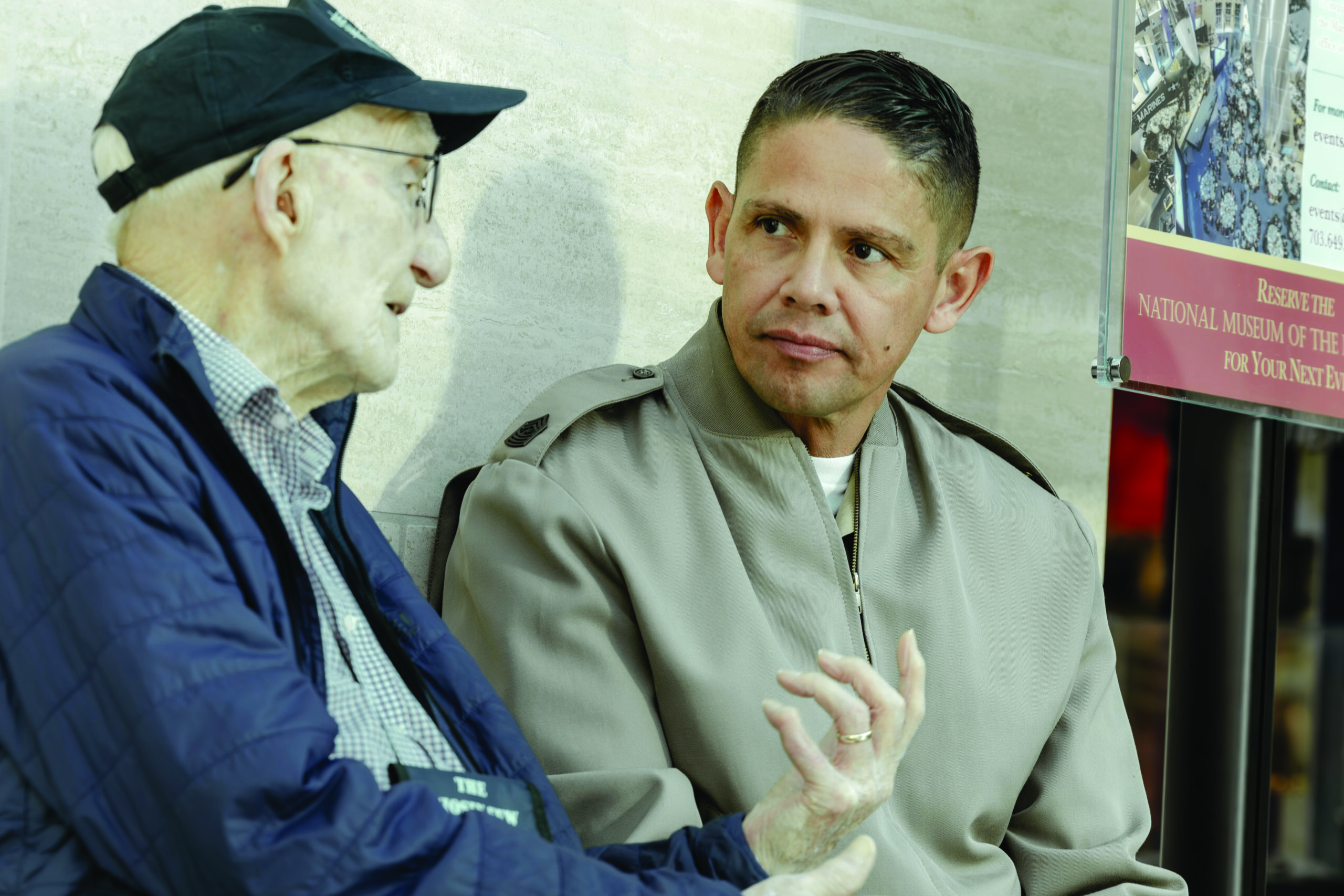
Protecting the Way: Sergeant Major of the Marine Corps Carlos A. Ruiz: A Committed, Engaged Leader of Marines
By: Kyle WattsPosted on March 15, 2024
On Nov. 29, 2023, I had the opportunity to interview Sergeant Major Carlos A. Ruiz, the recently appointed 20th Sergeant Major of the Marine Corps, at his office in the Pentagon. I looked forward to our conversation, as I knew little about him beyond his official bio and hoped to understand what kind of Marine and leader he is. I arrived prepared with questions focusing on the current state of the Corps, and where we are headed. To my surprise, the interview kicked off with a series of questions directed at me. The Sergeant Major wanted to know about my time on active duty and my time since in the civilian world. He asked about my wife, my children, and how my work life balances time for them. He even concerned himself with how much traffic I encountered on the way and if I found a parking spot. One question he posed proved most difficult, and I still wrestle with my answer.
“How long did it take you to find your way?”
As we progressed onto other topics, I realized his questions were no accident or mere pleasantries. They were a reflection of his personal journey through 30 years wearing the uniform and a genuine concern for individual Marines. I understood that some of the items I desired to ask him might simply be distractions from what is truly important in his eyes. The Sergeant Major’s philosophy on life and definition of his new role, however, remains focused on helping Marines find their way and preserving the way of the institution amidst a never-ending tide of change.
He first reflected on the many mentors throughout his career who helped him find his way in the Corps. The Sergeant Major was born in Mexico and became a naturalized citizen of the United States. Fresh out of boot camp in 1993 as a brand-new Marine warehouse clerk, Ruiz missed his flight to Okinawa after boot camp, leaving him UA to his first duty station in the fleet. The Sergeant Major laughed as he remembered this cringe-worthy entrance into the Corps, recognizing the importance of others pointing him in the right direction and setting him up for success.
“It’s the ability of others to make you focus on what is in front of you, and to see the potential in you,” he said. “I’m just glad that happened for me, that someone said, ‘you are more than this. You can do something else.’ That happened for me constantly. At every rank along the way, there was always somebody to touch me and say, ‘move this way.’ I have been very lucky.”
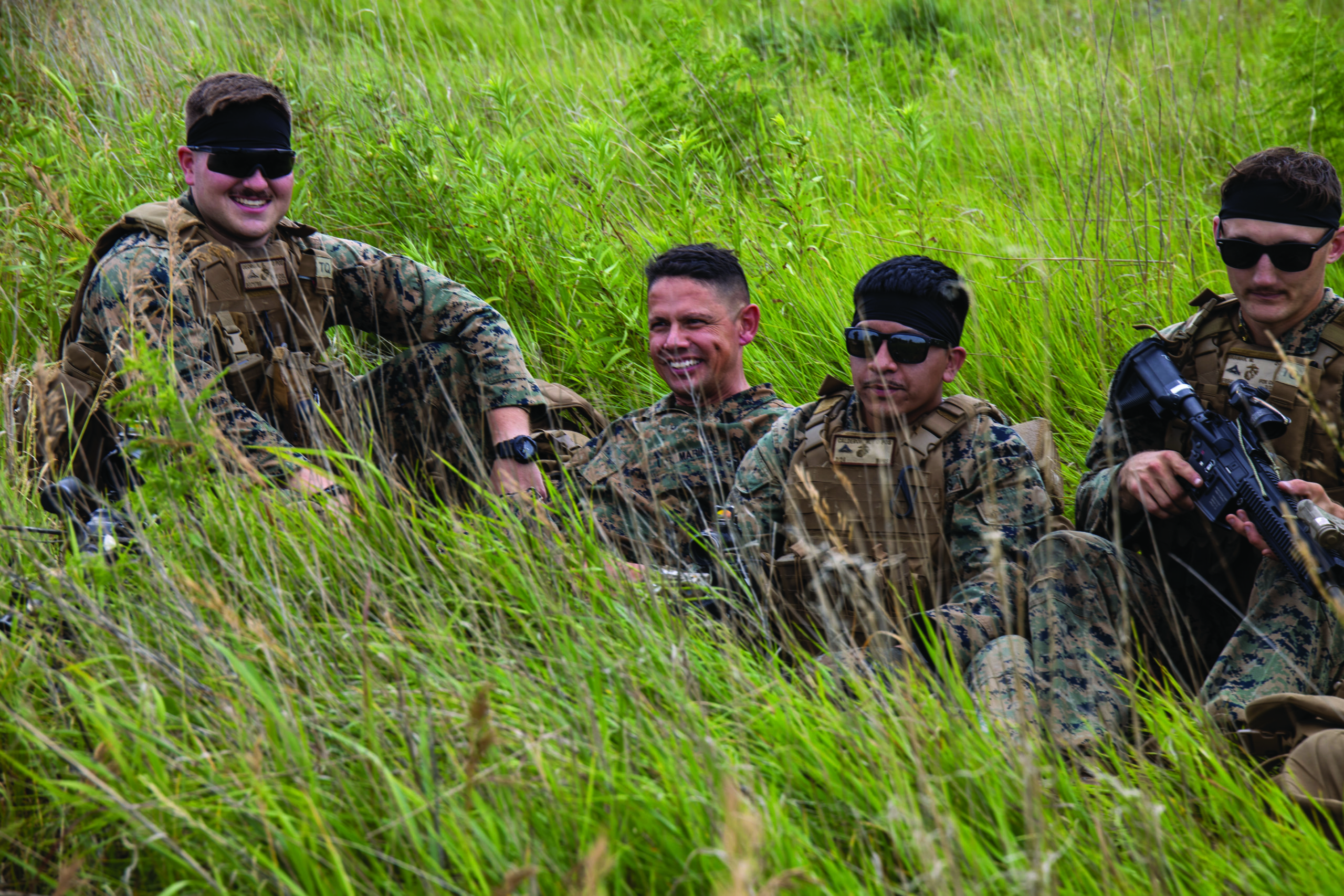
Fittingly, the first mentor to come to his mind was the first NCO he encountered in the fleet once he finally arrived in Okinawa. A Marine named Sergeant Tukes helped Ruiz push beyond his dismal start and taught him what the right path could look like.
“Sgt Tukes was an infantryman who couldn’t reenlist in the infantry. At that time, the Marine Corps was very small, so he reenlisted with a new MOS of warehousing. He was like a fish out of water, but Sgt Tukes and his NCOs were my entire world. When you’re young, there’s no first sergeant. There’s no battalion commander. You see them every once in a while, but my world was with Sgt Tukes. He was the person who looked like, walked like what I imagined a Marine should be like. Everything that was promised at some point in my enlistment period was right there in front of me.”
A machine-gunner by trade, Tukes led his section of warehouse clerks like a machine-gun section and ensured they believed that in Sgt Tukes’ world, every Marine was truly a rifleman. Ruiz and the other junior Marines fought for a spot on the machine-gun team to spend more time with their sergeant. They loved to hate him on their routine hikes across the island, watching in awe as he remained on his feet pacing back and forth during breaks, forcing them to drink water and recite general orders or machine-gun data.
“That was a great experience for me,” Ruiz remembered. “I was sold. When you have someone like that, then you spend the rest of your career trying to be Sgt Tukes for someone else. If I can just get others to feel what I felt, I think that’s the hook.”
Three decades have passed since his time with Sgt Tukes, with opportunity and accomplishment at each stop along the way. Ruiz spent three years on recruiting duty early in his career, and later four years as a drill instructor. To this day, his time as the Drill Instructor School’s chief instructor remains one of his proudest accomplishments. He deployed to Kuwait in January 2003, pushing north to Iraq that March with the opening of Operation Iraqi Freedom. His first experience with an infantry battalion in combat came as the company first sergeant with Lima Company, 3/4, while deployed to Afghanistan in 2009. In addition to his duties as the company first sergeant, Ruiz served as the Shock Trauma Platoon Commander, helping evacuate wounded Marines from the front line to medical care. He completed a second tour in support of Operation Enduring Freedom before receiving orders to Inspector-Instructor Staff.
He returned to the infantry in 2013 on his first assignment as a newly minted sergeant major, serving with 3rd Battalion, 5th Marines. He served in various assignments through the last decade, most recently holding dual roles as the Command Senior Enlisted Leader for both Marine Corps Forces Reserve (MARFORRES) and Marine Corps Forces South (MARFORSOUTH).
Ruiz took over his current role in August 2023. He accepted the responsibility with characteristic joy and humility.
“There was no plan for this, there was no plan to be this!” SgtMaj Ruiz said. “The jubilation I felt when I found out I had been selected to be Sergeant Major of the Marine Corps, though, was no different from the way I felt when I was selected for lance corporal. And then again for corporal, and again at every rank. It was terrifying. I’m thinking, ‘wait, you think I can be a corporal?’ But someone said, ‘yes, you can.’ The fear of letting others down drives you to work, prepare, and to really listen to what the force and the environment is telling you.”
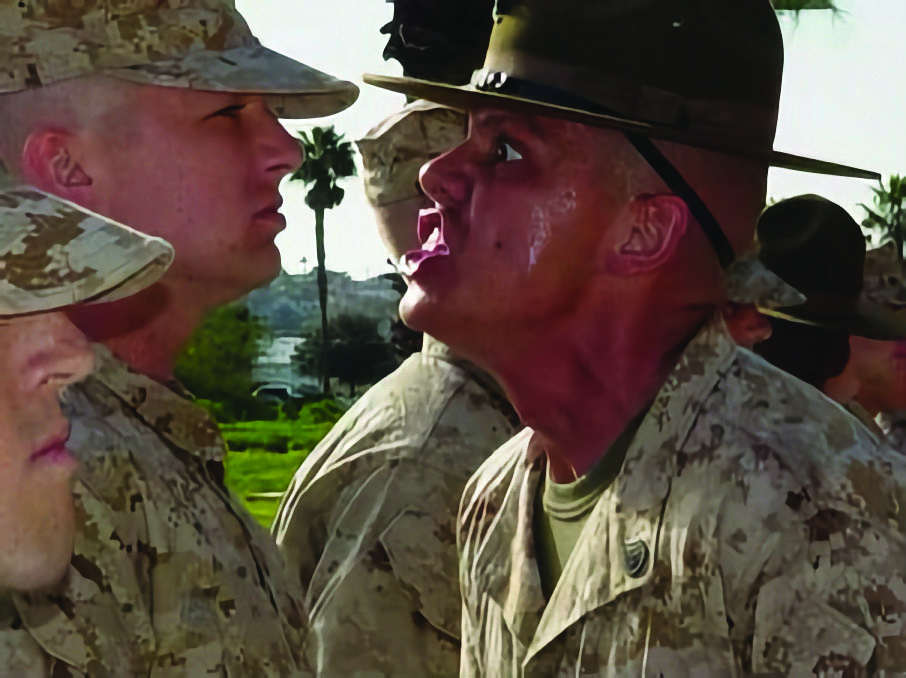
SgtMaj Ruiz defined his role as a representative and voice for all Marines, officer and enlisted, on all institutional programs and how the Marine Corps is preparing for the future.
“What’s bigger,” he added, “I am the one person that must deliver to the individual on the promise of what it was going to be like to be a Marine. The promise we made to each Marine and their families. The promise that we made to the American people, that who we say we are, we are. If we are not moving in that direction and doing the things that are synonymous with being a Marine, I think that’s where I belong the most.”
Force Design 2030 initiated a rapid sequence of changes across the force. Now, several years into its implementation, Ruiz made clear his take on the future.
“General Smith came in and told us to get rid of the, ‘2030.’ When you look at what the threat is today, we needed to change. Sometimes we have a habit of going head on into a brick wall over and over and over again, and the environment is compelling us to change. General Berger got us on the right path, and General Smith continues with that, he’s just saying change faster. Take all the platforms and whatever fancy things we are buying, put them in the hands of the Marines, and they’ll come back to us and tell us how to better employ it. All the technology is good, because we need to give an advantage to our Marines, but it is the human being that we continue to invest in. We can keep investing in technology, but Force Design 2030 is not designing a way out of the culture of what a Marine is. We are not redesigning that. We are just making it more lethal.”
In addition to fielding all the new gear, Marines across the fleet experienced the changes to training, MOSs, unit sizes and deployment strategies. Heavy financial investments have already been made to modernize equipment and training for fighting the next war dispersed across the Indo-Pacific.
“I don’t think we will ever finish changing,” Ruiz said. “I think the moment we think that we have arrived and are finished changing, someone is going to kick our ass.”
Through all the changes, the Sergeant Major admonishes the entire Marine community to remain focused on who we are. While the changes taking place might alter the direction and outlook of the Corps as an institution, and raise concerns and controversy, they do not change the identity of Marines.
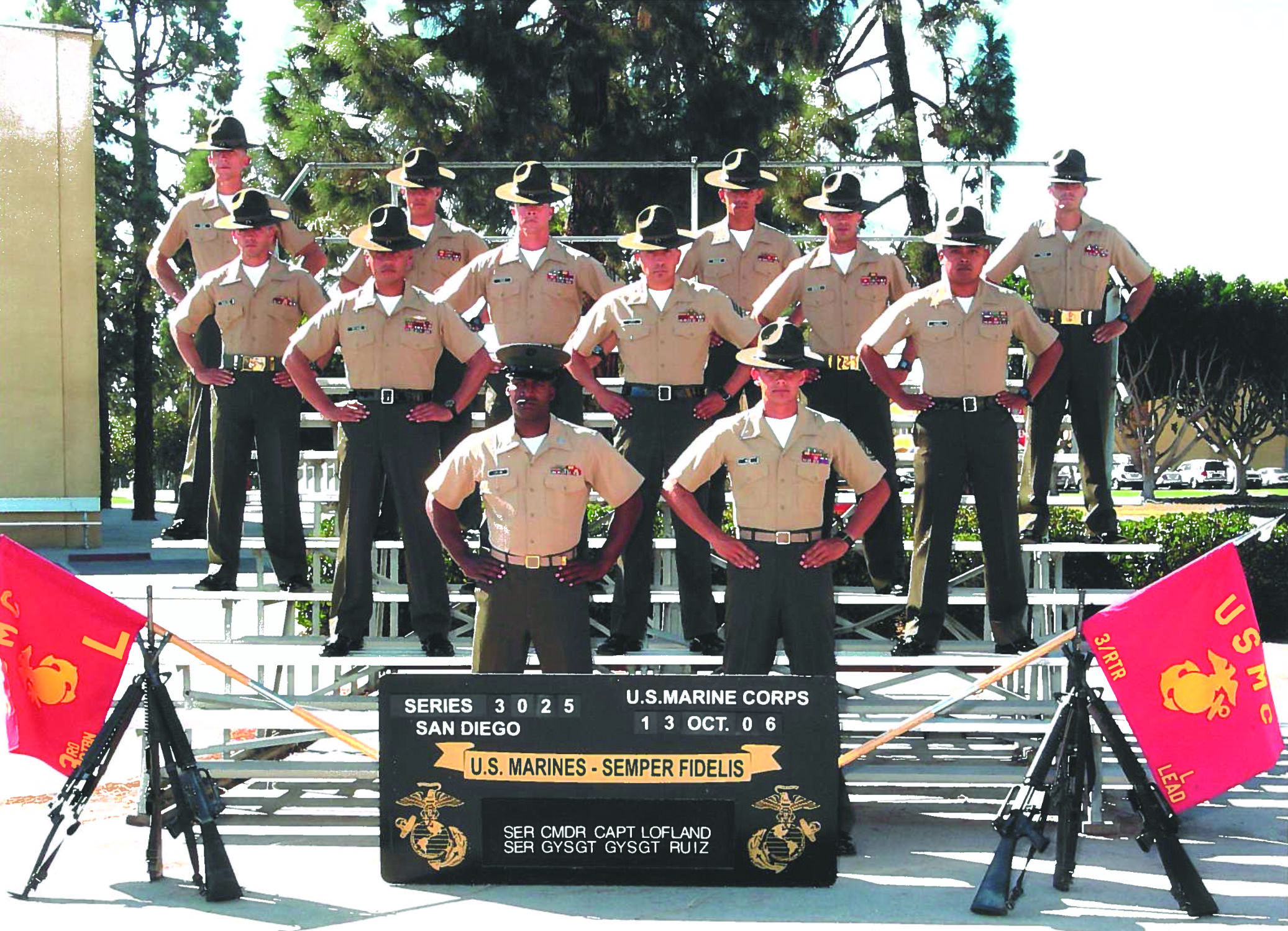
“Even the worst critics who might spend all year shooting at my target, on Nov. 10, they’re not,” he reflected. “There is an expectation of the veteran community for us to be better than they were. I think it’s my job to find a better way to communicate that we are. This generation is not only meeting the standard of 10 years ago but elevating that standard for the next fight. You can get distracted by what’s on the news or the political environment or whatever is going on today, but if you go to Twentynine Palms right now, there is still a Range 400 happening. The Marines are still as fit. They’re still as sweaty, stinking, carrying everything they have to carry, and they’re still running towards the objective. They’re still closing in on the last 300 meters and accomplishing the mission. They’re a little smarter and a little faster. They call it, ‘innovation’ today. It’s a fancy word, but it’s still the Marine way. Getting the job done and a culture of winning has not changed. I want to evolve, but I want to protect that culture.”
To help accomplish this goal, Ruiz frequently relies on social media to connect with Marines and the veteran community. His message of transparency and positivity has proven successful and trusted. In one example at the end of October 2023, when the Commandant experienced a heart attack and was hospitalized, the Corps chose to officially share this news through SgtMaj Ruiz. His belief in the power of social media comes tempered with the understanding that each content creator’s motivation will dictate the positive or negative impact of their message.
“On social media today, there are a lot of very serious Marines at all ranks with professional accounts who are trying to mentor. They see a need, and they use these platforms as a way to fill a gap and spread information like steel sharpening steel. I say, ‘yes please! Give me more!’ I engage on social media because you can’t get to know me or what I think by reading an ALMAR, MARADMIN, or a letter from the Sergeant Major of the Marine Corps. I can’t be everywhere at once, so I try to use social media to show Marines that it’s OK to smile, it’s OK to be happy when it’s time to be happy, and serious when it’s time to be serious, to be transparent as best as I can. What I don’t appreciate about social media is when the uniform is used to deliver something motivated by instant gratification, looking for likes or views. If you could imagine yourself 10 years from today talking about your service and someone pulled up these videos, I want you to do that before you hit post. It may gratify whatever that itch is today, but it doesn’t age well. I would ask those Marines with a foothold on social media to just think and use it for good. What do you want to be thought of our brand?”
His views on the importance of transparency are bolstered by his experience as a recruiter early in his career, and the understanding that transparency remains the key ingredient to the Corps success in recruiting. Last fiscal year, the Marine Corps succeeded as the only branch of service, other than the comparatively small Space Force, to achieve its targeted recruiting numbers. This proved a remarkable accomplishment in the current climate and speaks directly to the enormous effort of Marine recruiters. Across the board, they exceeded their target of more than 33,000 non-prior-service enlistments in FY23. The Space Force, by contrast, achieved its recruitment goal of less than 500.
“Imagine having a job where 99 percent of people tell you ‘no’ every day, and you’re just searching for that one ‘yes.’ All the credit goes to the recruiters. They’re the ones working the extra hours and driving the extra miles. We recruit and retain at the rate we do because our recruiters are pretty transparent about what we’re going to do to you. Somehow, that transparency is rewarded by interest. This is still one of the very few places in America where there is still a rite of passage, and that’s attractive. Our part, then, is if we are not who our recruiters say we are; professional, disciplined, lethal; then we cannot recruit.”
In addition to recruitment, retention emerged during the interview as another key focus today. Several Talent Management programs within the Force Design structure have cut through red tape, making it easier for Marines to reenlist. Marines with specific skill sets, such as cyber security certificates, can more easily enlist directly into those types of MOSs. Rules regarding families with both spouses on active duty have changed so that families cannot be split between separate duty stations unless a General Officer approves the decision. Other checks and gates have been implemented for certain family situations in an effort to keep Marines and their families connected to their support system and to each other.
“The institution will always come first, and some things we won’t be able to make perfect for everyone, but we are trying,” Ruiz stated. “The point is, it’s a signal to our people that we are making steps to understand their situation.”
The Sergeant Major focused on the total force when discussing retention, both active and reserve Marines. He credited his time as the sergeant major of MARFORRES with illuminating the full value of the reserve component and the important role it plays in the overall mission of the Marine Corps. For Marines set on leaving active duty once their contract is up, career planners are working hard to show them how remaining in uniform with the reserve can benefit them, as well as the Corps.
“From very early on it’s a fight for talent to stay, and a fight for where [to stay],” Ruiz said. “It’s OK to go active or reserve. Service is service, and I just want access to you when it’s time.”
In view of the total force, Ruiz included the veteran community, placing immeasurable value on what these Marines add. As the number of active Marines with combat experience dwindles, specifically at the ranks of sergeant and below, Marine veterans increasingly represent the sole source of knowledge and perspective on this all-important topic.
“I need the veteran community,” he said. “Not just to stand on the sidelines, but to engage with the active community. I remember as a young sergeant in Sergeant’s Course at Twentynine Palms, Colonel Mitchell Paige, Medal of Honor recipient, came to tell us his story. No one in the room was breathing. He spoke about the night and when it was over, the bodies around his machine gun, and I was just in awe. I imagine experiences like that have happened frequently over the last 248 years. The wise leaders will find time to bring in those veterans to talk to their Marines. We need it. What we get from them in that 45-minute conversation, we can’t duplicate in days of PME.
There’s only one of me, but there’s a lot of veterans out there who care. I think I owe from my billet a lot more engagement to the veteran community to bring them in, to help them understand the environment of where we are at and what the threat is, and how much we need their help. We are all in it. If you ever wore the uniform of a Marine, it takes all of us to make the Marine Corps who we say we are.”
When you hear the Sergeant Major speak in person or through social media, his concern for preserving the Marine Corps way rings genuine. His commitment to individual Marines comes through with a positive and refreshing message. Like Sgt Tukes did for him three decades ago, SgtMaj Ruiz still believes that any Marine can be a powerful influence and help someone else find their way in the Corps.
“This is what I have been trying to get through to the Marine Corps; you don’t have to wait until you’re older to be excited about being a Marine. You don’t have to wait until you’re out the service and you start looking back and think, ‘this was a good time in my life.’ I don’t want you to wait until then. I want you to wake up in the morning and make a choice that you can have that impact today.”
Author’s bio: Kyle Watts is the staff writer for Leatherneck. He served on active duty in the Marine Corps as a communications officer from 2009-2013. He is the 2019 winner of the Colonel Robert Debs Heinl Jr. Award for Marine Corps History. He lives in Richmond, Va., with his wife and three children.




